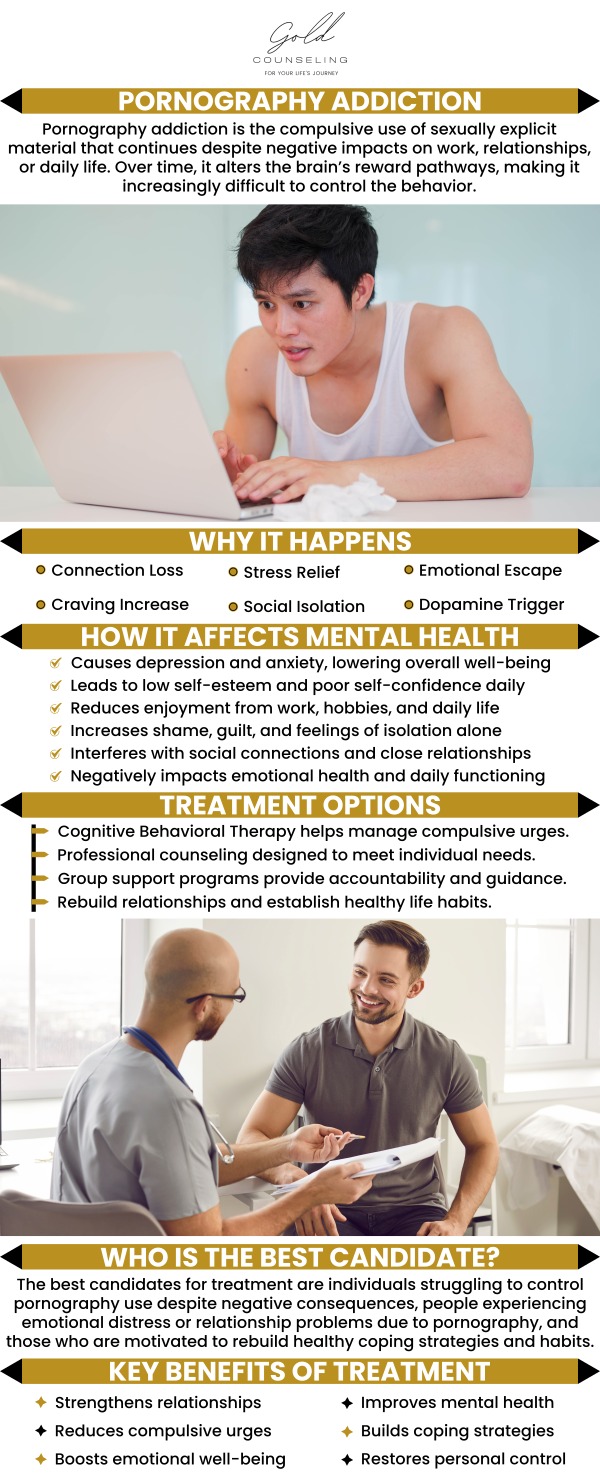Facing Pornography Addiction: A Guide for Men Who Feel Isolated
At Gold Counseling, we provide specialized support for men dealing with pornography addictions and feelings of isolation. Our team understands the emotional toll of addiction and works with you to break free from unhealthy patterns and rebuild self-esteem. We offer a confidential, non-judgmental space for healing and personal growth. For more information, contact us or schedule an appointment online. We have convenient locations in Riverdale, Kaysville, Draper, and St. George, UT.




Table of Contents:
What is a pornography addiction?
How does a pornography addiction affect mental health?
Why are pornography addictions more common among men?
How can pornography addictions lead to feelings of isolation?
A pornography addiction is a behavioral condition where an individual develops a compulsive reliance on sexually explicit material despite harmful effects on their personal life, relationships, or overall well-being. This reliance often develops gradually, with repeated exposure creating associations between pornography and the brain’s reward responses. Over time, the stimulation provided by pornography can become difficult to avoid, sometimes interfering with interests, responsibilities, and overall mental wellness.
As the pattern deepens, individuals may find themselves devoting more time and attention to viewing pornography, often in ways that interfere with daily life. Some may even escalate the type or amount of material consumed in an attempt to recapture the same level of stimulation experienced early on. This escalation can create a self-perpetuating cycle. The brain adapts to high levels of stimulation, leading the individual to require more frequent or intense exposure to achieve the same effect. In the absence of pornography, they may experience restlessness, irritability, or a diminished ability to enjoy everyday experiences. These withdrawal-like symptoms make it more challenging to break free from the pattern without targeted help.
Professional support at Gold Counseling often focuses on understanding the root causes that fuel the addiction, such as emotional distress, boredom, or unresolved trauma. By addressing these underlying issues, and combining that insight with strategies to reduce consumption, many individuals can gradually regain control, rebuild healthy habits, and restore balance to their daily lives.
A pornography addiction can alter the brain’s reward pathways, changing how pleasure and motivation are experienced. As someone repeatedly seeks out the heightened stimulation pornography provides, ordinary activities may feel flat or unfulfilling in comparison. This diminished ability to enjoy life can contribute to a range of mental health challenges, including low mood, reduced motivation, and persistent dissatisfaction. Over time, these effects can evolve into clinical conditions such as depression or anxiety. Many individuals struggling with a pornography addiction keep their habits hidden out of shame or fear of judgment. This secrecy can foster feelings of guilt, self-criticism, and disconnection, which in turn can worsen symptoms of mental distress. When unaddressed, this emotional strain can erode self-esteem and make it harder to reach out for help.
In some cases, the compulsive nature of pornography use can also impair concentration, memory, and decision-making. This mental fog may be linked to the overstimulation of neural pathways, which can leave the brain less responsive to everyday rewards. As these cognitive effects compound, they can impact job performance, academic achievement, and overall functioning, further contributing to feelings of frustration or hopelessness.
Recovery often involves addressing both the behavioral patterns and the emotional impact of the addiction. Therapeutic approaches can help retrain the brain’s reward system, restore confidence, and rebuild the individual’s ability to find satisfaction in non-sexual aspects of life. With consistent support, improvements in mood, focus, and self-worth are not only possible but often sustainable.
Pornography addictions are more frequently reported among men, which is influenced by the differences in how sexual stimuli are processed biologically. Research suggests that men often have stronger visual sexual responses and a greater appetite for novelty in sexual experiences. These tendencies can make explicit content particularly stimulating, which in turn increases the risk of developing compulsive viewing habits.
Social and cultural factors also play a role in the onset of a pornography addiction. From an early age, men are often exposed to more permissive or even encouraging attitudes toward pornography, while open conversations about sexual health or emotional vulnerability remain less common. This combination can make pornography a more accessible and socially tolerated outlet, even when used to cope with stress or emotional discomfort.
In addition, certain societal expectations may pressure men to project confidence, control, and emotional independence. When personal struggles arise, turning to pornography can feel like a private and non-confrontational way to self-soothe, despite the long-term risks. Over time, this coping mechanism can evolve into dependency, particularly if it replaces healthier ways of processing emotions.
While men are statistically more likely to experience pornography addictions, the condition can affect individuals of any gender. Understanding the intersection of biology, psychology, and cultural norms can help guide more effective prevention and treatment approaches tailored to the unique needs of each person.
Pornography addictions often reshape how individuals engage with social and intimate relationships, sometimes replacing real-world interactions with solitary behaviors. As this pattern becomes more and more entrenched, opportunities to connect meaningfully with others may gradually diminish. Over time, the ease and immediacy of pornography can seem more appealing than the effort and vulnerability required in real-life connections, leading to greater detachment. Many people struggling with this behavior avoid disclosing it to friends, partners, or family members, fearing judgment or rejection. This reluctance to be open can create emotional distance and erode trust, even in otherwise close relationships. As these connections weaken, the sense of being alone can become more pronounced.
Isolation can also be reinforced by cycles of shame and withdrawal. When someone feels disconnected, they may turn more heavily to pornography as a source of comfort or distraction, which in turn keeps them further removed from others. This loop can be difficult to break without deliberate steps toward social reconnection.
Reversing isolation often involves both reducing the addictive behavior and creating new opportunities for engagement and can be guided by specialists at Gold Counseling. Building trust, fostering open communication, and participating in shared activities can help restore the bonds that may have weakened. With time, many individuals find that a genuine connection can offer a far deeper sense of fulfillment than the temporary relief provided by pornography.
Counselling for pornography addictions is available at Gold Counseling. Contact us today or schedule an appointment to begin your journey toward healing and healthier relationships. We serve patients from Riverdale UT, Washington Terrace UT, Clinton UT, Kaysville UT, Clearfield UT, Farmington UT, Draper UT, Riverton UT, Sandy UT, St. George UT, Bloomington UT, Santa Clara UT, and surrounding areas.
Check Out Our 5 Star Reviews



Additional Services You May Need
▸ Relationship Counselling
▸ Couples Counselling
▸ Individual Therapy
▸ EMDR Therapy
▸ Spiritual Healing
▸ Disordered Eating
▸ LGBTQIA+ Therapy
▸ Group Psychotherapy
▸ Life Coaching Therapist
▸ Depression Treatment
▸ Mental Health Clinic
▸ Life Transition Therapy
▸ Telehealth Counseling
▸ Cognitive Behavioral Therapy (CBT)
▸ Dialectic Behavioral Therapy (DBT)


